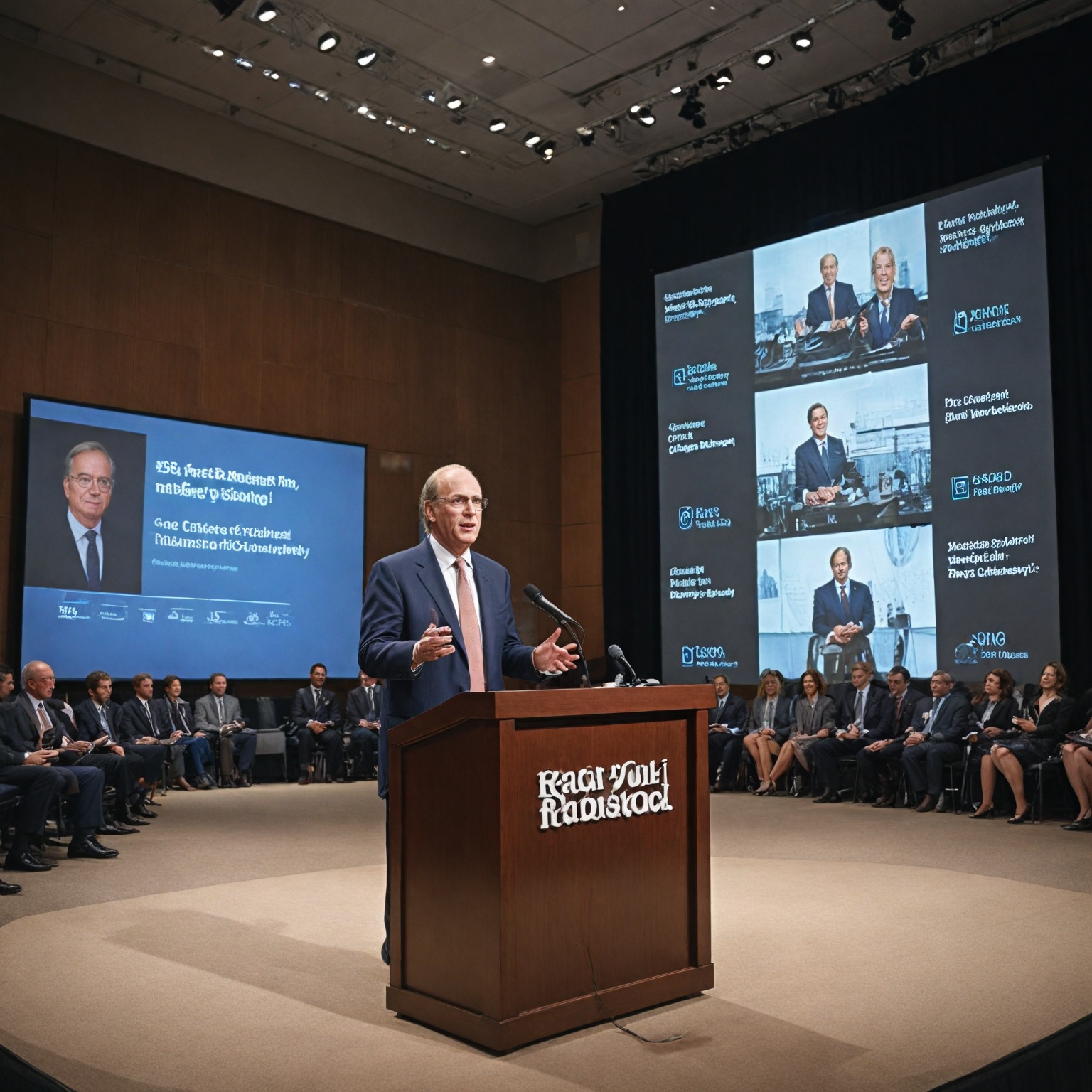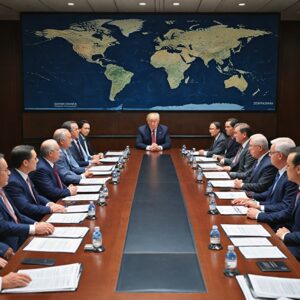Summary
Larry Fink, the CEO of BlackRock, has made notable statements regarding the deteriorating state of the global economy. As an influential figure in the global financial sector, Fink’s warnings, based on a range of issues including a decrease in global birth rates, China’s economic policy shift, and the ongoing European energy crisis, have garnered significant attention. Fink stresses the importance of strategic investments and portfolio diversification in navigating market volatility, with his guidance strongly reflected in BlackRock’s approach, including their recent acquisition of private market information provider Preqin.
Fink’s annual letter to fund managers and business leaders worldwide offers strategic advice underpinned by his expertise in global economic issues and their impact on various sectors. His approach emphasises the identification of capital for investment, a challenging process during economic downturns. Fink’s insights are particularly relevant in the current economic climate, marked by economic uncertainty spurred by changes in the Trump administration, inflated prices hindering potential fiscal stimulus, and significant disruptions in various industries due to societal crises like the COVID-19 pandemic.
In a recent speech at the 2022 New York Times DealBook, Fink underscored the need for businesses to strategize and prepare for potential downturns, highlighting the success of companies in the information technology sector during the Q1 2020 economic downturn. His warnings have significant implications for various sectors, including hospitality, finance, and trade. Fink emphasizes that the finance industry needs to focus on risk management, sustainability, and client resilience in the face of inflation and geopolitical challenges, and that protectionist measures in trade can harm the very people they aim to protect.
Fink’s approach for investors and companies navigating these uncertain times is characterized by a mix of active and index strategies, the expansion of client access to private markets, and a strong emphasis on sustainable investment approaches. He also points to the need for proactive government measures to diversify economies during periods of economic uncertainty. Fink and his institution predict a “new regime” by 2023 characterized by heightened macroeconomic and market volatility, suggesting that diversification, particularly in the $12.5 trillion workplace retirement plan market, will be crucial for risk management.
Larry Fink
Larry Fink is the CEO of BlackRock, a leading global investment firm, and is renowned as an influential figure in the global financial sector. Fink has been vocal about his concerns regarding the economic downturn and the increasing anxiety of clients, leaders, and individuals towards the economy.
During an interview in New York, Fink highlighted the evolution of the economy, emphasizing that it was traditionally more consumer-driven, with an inclination towards cheap and progressive products. However, he also expressed concerns regarding a number of issues that could impact the economy significantly. Among them are a decrease in birth rates globally, a shift in China’s economic policies, and the ongoing energy crisis in Europe.
Fink has emphasized the importance of strategic investments and portfolio diversification to navigate market volatility. His guidance is particularly relevant to his company’s approach in the current economic climate, particularly in light of BlackRock’s recent acquisition of Preqin, a provider of private market information. This acquisition is seen as part of BlackRock’s commitment to enhancing its analytics to facilitate risk understanding in private markets and improve client navigation during volatile times.
In his annual letter to fund managers and business leaders worldwide, Fink encouraged them to focus on strategic decisions and avoid political distractions. The message was clear – keep your heads down and concentrate on business matters amidst the economic uncertainty.
Fink’s extensive expertise in global economic issues and their effects on the business environment underpin his strategic advice to both Deloitte’s clients and leaders. He recognizes the inevitable impact of economic downturns on various sectors, such as the hospitality industry, where there’s typically a drop in travel and reduced occupancy rates leading to lower revenues. His strategic insight emphasizes the importance of identifying capital for investment, a process that becomes increasingly challenging during an economic downturn.
Throughout his career, Fink has been a proponent of making strategic investments to navigate uncertain economic times, emphasizing the importance of tools and processes that can anticipate and address industry challenges.
Economic Warning
Fink issued a stern warning regarding the deteriorating state of the economy in his 2025 annual letter. He expressed concern over the spreading economic uncertainty instigated by drastic changes brought about by the Trump administration. According to him, this uncertainty has resulted in broad-based disruption affecting companies and federal workers. Wall Street, Fink points out, is being shaken by signs of a faltering economy, and he suggests that it is possible for the US economy to stagnate, though he expects this would likely be short-lived.
Fink raises an alarm over the current economic condition marked by inflated prices, resulting in a bleak future for any potential fiscal stimulus. He asserts that deficits matter, and unwinding central banks’ quantitative easing and bond purchases is going to take years, thereby limiting their ability to stimulate the economy. In addition, Fink stated his belief that the economy won’t be based on real growth due to high interest rates.
Fink also highlights the economic impact of the trade war initiated by the Trump administration. Critics argue that protectionist measures often hurt the people they intend to protect by stifling markets and slowing economic growth. Increased tariffs can lead to price increases, especially for manufactured goods, and negatively affect manufacturers’ profit margins. In his warning, Fink specifically points out the potential consequences of broad-based tariffs, such as shifting the tax burden from higher-income to low- and moderate-income households, and causing negative economic side effects relative to income taxes.
Further, he notes the significant disruptions in industries like tourism and hospitality due to societal crises, including the COVID-19 pandemic. Fink has expressed concerns about the lack of adequate savings for retirement among Americans, calling it a crisis, and suggesting that the anxiety surrounding retirement is contributing to the general state of unease.
Finally, Fink emphasizes that geopolitical challenges, including Russia’s attack on Ukraine, have disrupted the world order that has been in place since the end of the Cold War. He asserts that these actions will affect geopolitics, macro-economic trends, and capital markets for decades to come.
CNN Business Insight
In a recent speech at the 2022 New York Times DealBook, Fink shared his concerns about the deteriorating global economic conditions. He raised a few key issues, such as a global decline in birth rates, a shift in China’s approach from economic to ideological, and the ongoing energy crisis in Europe.
These conditions, combined with uncertainties surrounding central bank policies, indicate potential challenges for various industries, including information technology and hospitality. Fink’s observations underscore the need for businesses to be proactive in strategizing and preparing for potential downturns.
Companies in the information technology sector, for instance, managed to yield double-digit returns during the Q1 2020 economic downturn, proving that certain sectors can withstand, and even thrive, amidst challenging economic climates.
In the hospitality sector, businesses are urged to invest in tools and processes that allow for better pricing strategies, labor and food cost management, demand forecasting, and customer experience improvement. Despite the industry’s inherent challenges, such as fluctuating consumer spending, high labor costs, and regulatory compliance issues, success is achievable by addressing these challenges head-on.
Furthermore, airlines and hotels can also learn from companies that have performed well during recessions, demonstrating that strategic planning can offer more than mere survival.
This call for companies to take proactive measures ahead of an impending recession in the tourism industry not only encourages survival but also emphasizes the potential for long-term performance.
Impact of the Warning
Fink’s warnings have significant implications for various economic sectors, including hospitality, finance, and trade. The hotel and lodging sector, part of the larger hospitality industry, could experience reduced demand due to consumers curtailing travel and leisure spending during periods of financial uncertainty.
The impact extends to the finance industry as well, as Fink emphasized the need for risk management, sustainability, and client resilience in response to the threats of inflation and geopolitical challenges. He pointed out that negative interest rates adopted by central banks to stimulate economic growth are significantly hurting the world’s savers and pushing investors into riskier, less liquid asset classes with potentially hazardous financial and economic consequences.
Furthermore, Fink’s warning has implications for the trade sector, especially in the context of escalating trade wars and tariffs. Increased trade barriers could disrupt global supply chains, slow the diffusion of new technologies, and ultimately lower global productivity and welfare. More import restrictions could also make consumer goods less affordable, disproportionately affecting low-income households.
Additionally, Fink’s warning might impact the stock market and investment strategies. Economic downturns could provide opportunities for certain investors, but these opportunities require careful navigation and innovation to avoid risks and achieve desired goals. Furthermore, small businesses, which make up a significant portion of the U.S. economy, may fare worse than larger entities during a recession due to their lesser ability to absorb revenue drops amid mounting economic uncertainty.
Strategies for Investors and Companies
As the economy navigates uncertain times, BlackRock has taken innovative measures to deliver long-term investment performance. The company focuses on risk management, sustainability, and client resilience amid inflation and geopolitical challenges.
Active and Index Strategies
BlackRock’s strategies involve a mix of active and index strategies. The goal is to give investors the freedom to blend these strategies seamlessly, according to the amount of risk they’re comfortable taking and their preferred way of managing that risk. The company has developed advanced technology to better manage risk, expanded choice, and lowered fees through products like exchange-traded funds (ETFs).
Private Markets and Investments
Another strategy Fink noted is the expansion of client access to private markets, which finance global businesses and keep consumer economies running. BlackRock has been making acquisitions to facilitate this. Private credit assets, for instance, are projected to double by the end of this decade, offering potential opportunities for growth.
Sustainable Investment Approach
Fink also emphasizes sustainable investment approaches, underscoring the importance of significant progress in management and reporting of climate-related risks. Companies are encouraged to transition to a net-zero economy. This approach aligns with the increasing global standards that allow investors to compare companies’ progress.
Economic Considerations
As part of investment strategies, Fink has highlighted the implications of Americans not saving enough for retirement and the economic advantages of acquiring major trade routes such as the Panama Canal ports. The economic uncertainty, the impact of AI, and evolving investment strategies are factors taken into account.
Hospitality Industry Investments
The hospitality industry is an example of where the company has made significant investments, despite its challenges. These investments are aimed at mitigating business risks, improving financial performance, and enhancing the customer experience. Investments in cybersecurity tools and processes have also been made to keep pace with the evolving cyberthreat landscape.
Stock Market and Interest Rates
Investors are advised to adapt their portfolios according to fluctuations in the stock market, interest rates, and inflation. A fresh look at managing cash and investments in today’s changing interest rate environment can support the pursuit of their financial goals.
Addressing Economic Uncertainty
In periods of economic uncertainty, there are direct effects such as a reduction in consumer spending, which affects sectors such as retail, hospitality, and tourism. To mitigate these effects, Fink suggests proactive measures by governments to diversify their economies.
Related Economic Forecasts
Fink and his institution foresee a shift in the global economy, predicting a “new regime” by 2023 characterized by heightened macroeconomic and market volatility. They also suggest that central banks may not be able to provide the same level of intervention during economic downturns as they have in the past. Fink’s 2025 letter further emphasized this economic uncertainty, citing risks such as inflation and geopolitical challenges, along with the disruptive potential of AI.
The predicted economic changes are not all negative, however. Some models suggest that impactful policy changes could potentially lead to a booming economy with a lower unemployment rate than in the baseline scenario. On the other hand, these models also indicate that trade wars and persistent inflation, which are not fully accounted for in the baseline scenario, could occur if these policy changes are implemented.
In light of these projections, Fink argues for the need to diversify investment portfolios, particularly in the context of the $12.5 trillion workplace retirement plan market. This is part of BlackRock’s broader approach to risk management, with the institution prioritizing sustainability and client resilience amidst these uncertain economic conditions.
The content is provided by Avery Redwood, Fact-Nest













